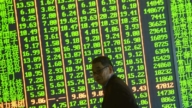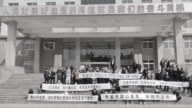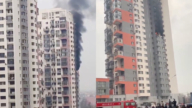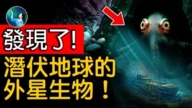【新唐人2014年12月20日訊】近期,中國大陸民間融資風險集中爆發。隨著各地民間借貸和投資擔保公司頻頻倒閉,這個「始於全民放貸高息狂歡,崩於借款企業資金鏈斷裂,終至『全民討債』」的一幕,正在各地上演。除了暗中流淌的百億資金,更多的是債權人的無盡擔憂和悔恨的淚水。
今年7月份,四川省最大的民營融資擔保公司之一——匯通信用融資擔保公司的高管「失聯」,涉及民間融資超過30億元。匯通擔保事件後,四川民間金融市場依舊餘震不斷,各類理財和居間公司資金鏈斷裂案件頻發,老闆跑路、失聯,甚至被抓,成了民間借貸圈的常態。
據大陸媒體報導,今年8月,成都民企龍頭怡和集團負債超過40億元,其中牽涉民間高利貸16億元;9月,理財公司聯成鑫和四川財富聯盟違約,涉及金額都在2億元左右﹔10月初,P2P平臺鉑利亞無法提現,涉及金額7000多萬元。
另外,《中國茉莉花革命》網站報導,四川鑫眾偉業投資管理有限公司在12月宣稱,項目方資金鏈斷裂,無法支付本息,涉及金額也超過7000萬元。
18號,該網站還刊登了四川鑫眾全體債權人的求救信,指責四川當局推卸責任、封鎖消息,不向受害人通報案情,導致老百姓討債無門、維權無門,陷入極大的茫然和惶恐中。
《新唐人》特約經濟評論專家傑森‧馬認為,中共當局對民間融資基本上是採取「懶政」的不作為手法,從而導致民間借貸亂象叢生。
傑森·馬:「它(中共)知道如果強硬的把這條路砍死的話,可能很多中小企業一下就垮掉了。當然另一方面它也知道這些企業的還債能力是風險很大的,它就把自己擺脫出來,就是說『一個願打一個願挨』,那你就去搞吧,反正我也不管。」
《中國茉莉花革命》網站還披露,河南嘉信投資擔保有限公司以高息回報集資8個億,卻突然停止所有業務,並拒絕歸還本金給客戶,還聲稱省政府和公安局有人撐腰。數百名受害者在12月17號到省政府門口示威,抗議官商勾結的詐騙行為。
幾乎同一時間,河南富通資產管理有限公司破產,數億本金不能兌付。約200名投資受害人討債示威,卻被警察驅散,多人被抓捕。
北京國情內參首席研究員、中國金融智庫研究員鞏勝利:「中國的這種個人擔保公司,它的風險大還有一個問題,我一直在強調的政治資源。比如某一個市長,某一個縣長或某一個副市長是個貪官,貪官被抓了以後,他留下的黑洞沒有人能填的上來。」
有業內人士估計,80%的民間借貸資金都流向了房地產行業。
海外財經分析人士古春秋也向媒體指出,中國的經濟秩序混亂,擔保公司背後一般是房地產公司,而房地產公司的背後可能是當地政府,這是官商勾結的基本套路。
在河北邯鄲市,金世紀、萬聚、卓峰等當地主要私營房地產企業在今年先後違約,甚至人去樓空。僅金世紀一家的民間融資規模,就接近30億元,涉及的投資人約有5000人。
美國《紐約時報》通過其中一名受害人王女士得知,中共當局已經將曾經前往邯鄲市政府「上訪」,尋求幫助的大批受害者,視為重點維穩對像並嚴密監控,投資人組成的QQ群中也有當局的臥底。
王女士還說,自己每晚都在做噩夢,不敢想自己最終會損失多少。現在為了照顧生病的母親,沒有工作,沒有任何的收入來源。她表示,「如果拿不回錢,就只能自殺。」
傑森‧馬:「如果這個政府是對老百姓負責,它應該出臺相應的法律監管借貸的雙方。同時有這樣的案例出來的話,應該有統一的報導使老百姓充份理解這個事情的風險。但是中國不管從哪個角度,維穩、維持整個社會的經濟發展秩序各方面,它採用了政府不管,媒體不報。」
《紐時》引述西南財經大學經濟與管理研究院院長甘犁的研究數據稱,中國民間借貸的規模已經超過8萬億,而且普遍存在信息不對稱,借貸成本高,融資平臺門檻低、風控能力弱的特徵,因此存在很大風險。
《福布斯中文網》上的一篇評論文章也提醒,智者始而愚者終,5年前的放貸者可能是最精明的商人,而現在的放貸者可能成為龐氏騙局最後一棒的接棒者。
採訪/易如、陳漢 編輯/李明飛 後製/蕭宇
Army Newspaper: Tiger Behind Zhou Yongkang will be Hunted Down
After the downfall of Xu Caihou and other former military “tigers",
the CCP’s “tiger hunting" spread to all military academies,
Xi Jinping’s faction has taken more intensive action against
Jiang Zemin’s faction.
Recently, the CCP army newspaper published a
commentary article, believed to be a strong sign
of the clash between the two factions.
On 17 Dec, the CCP “People’s Liberation Army Daily"
published a commentary article titled
“Anti-corruption is a battle of life and death and can not
be lost".
The article analyzed and refuted two points of view,
“Anti-corruption will lose people’s support" and
“Can anti-corruption be continued".
It claimed that “It should end here" is just an illusion,
“have a tiger by the tail” is a misjudgment.
The article uses many harsh phrases such as “will not be
tolerated" and “eliminate all evilness" to respond to
the doubts of “whether anti-corruption can be continued".
It also highlighted, “Even big ‘tigers’ such as Zhou Yongkang,
and Xu Caihou have been hunted down, nobody will be spared."
It makes the outside world really wonder who the
army newspaper is referring to.
Some people believe that it may be Xi Jinping’s biggest
rival in the faction clash, Jiang Zemin.
Affairs commentator, Xia Xiaoqiang: “After the Fourth
Plenary Session, Xi Jinping accelerated the crackdown on
the Jiang faction."
“Especially after the announcement of the arrest of Xu Caihou
and Zhou Yongkang, the army newspaper
continuously published articles, with Xu Caihou upgraded from
“traitor" to “national demon".
“Army newspaper’s tone has been rising, even the
‘big tigers’ are hunted down, who else can be spared?"
“This sends a clear message, both Xu Caihou and Zhou
Yongkang are ‘big tigers’, and they are supported by
Jiang Zemin, such an argument points directly to Jiang."
Another speculation is that the article is alluding to another
General of the Jiang faction, Guo Boxiong,
who is a former vice chairman of Central Military Commission.
Overseas media observed that the credible Weixin account of
“Political Observer" had reports on Guo Boxiong.
The “Phoenix Weekly" recently had a report that revealed
the inside story of Gu Junshan’s corruption, it indirectly
mentioned that Guo Boxiong may be involved.
So it is natural for the outside world to relate the article
in the “People’s Liberation Army Daily" to Guo Bixong.
In addition, the article also pointed out “the confrontation
of corruption and anti-corruption was at stalemate",
it has reached a critical time and juncture that determines
success or failure.
Deepening anti-corruption will inevitably encounter
various obstructions and rebounds.
However, the article highlighted “there is no turning back",
and this is a “desperate battle".
In this regard, analysts believe that this article conveys the
attitude of Xi Jinping, categorically denying the possibility of
compromise in this power struggle.
Xia Xiaoqiang: “The army newspaper uses such clear and
strong words now, it releases two messages."
“One is Xi Jinping has encountered resistance from Jiang
faction after the downfall of Zhou Yongkang and Xu Caihou,
hence the article stated ‘we can not back down or lose
in this desperate battle’."
“The other is, Xi Jinping has sent a signal of the final decisive
showdown to the Jiang faction, via the army newspaper articles,
he also uses the military to warn and deter Jiang Zemin.
Since the CCP 18th National Congress, Xi Jinping took a series
of actions in national defense and military construction,
and quickly gained control of the military.
Then began the large scale “anti-corruption" operation.
Therefore, it is believed that the military is the backup force
of Xi Jinping’s “anti-corruption" and “tiger hunting", as well as
an important force in eliminating the Jiang faction.
Some analysts believe, the army newspaper voice for
Xi Jinping with such a clear stand, proves Xi’s control over
the military is quite secure.
Xia Xiaoqiang: “After Jiang Zemin obtained supreme
power in the CCP after the June Fourth Incident,
he began to ‘turn left’, and changed Deng Xiaoping’s
Chinese economic reform policy."
“On Jan. 1992, Deng Xiaoping began his southern tour, and
warned Jiang Zemin ‘people who stop reform would
be stepped down’."
“As Deng controlled the actual military power, the military
newspaper immediately issued the editorial
‘escorting Chinese economic reform’, and Jiang Zemin
immediately changed his attitude."
Insiders have revealed to the media, that the military
is the key to whether anti-corruption can continue.
So, “tiger hunting" in the military became the most important
fight in the desperate battle between Xi and Jiang factions.
In Nov. this year, during Xi Jinping’s state visit to Australia,
New Zealand and Fiji, it is reported that at least
eight generals in the CCP military were arrested.
Subsequently, it is reported that Major General Song Yuwen,
deputy political commissar of Jilin Military, and
Mafa Xiang, deputy political commissar of the Navy,
committed suicide.
Recently, the “anti-corruption" operation has spread to all
military academies.
After the Vice President of Nanjing Institute of Politics,
Dai Weimin was taken in for questioning,
the newly appointed director of the political department,
Colonel Ma Xiangdong shared the same fate in early Dec.
Earlier, Major General Gao Xiaoyan, the Political Commissar
and Discipline Inspection Secretary of the PLA Information
Engineering University had also been taken in for questioning.
She became the first female general to be investigated after
the 18th National Congress.
Those actions were regarded as the proof that
Xi Jinping is eliminating the last remnants of Jiang Zemin
in the military."
Interview/yiru Edit/zhangtianyu Post-Production/xiaoyu

























